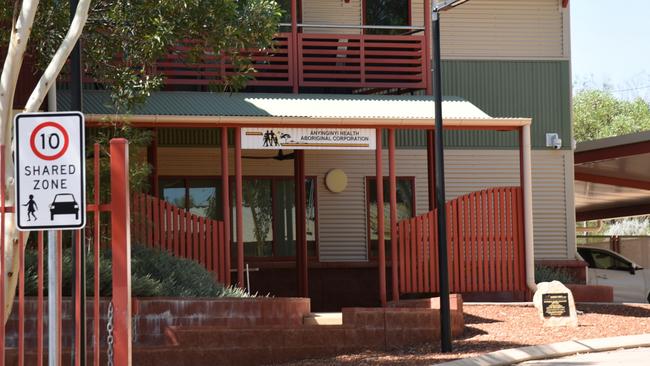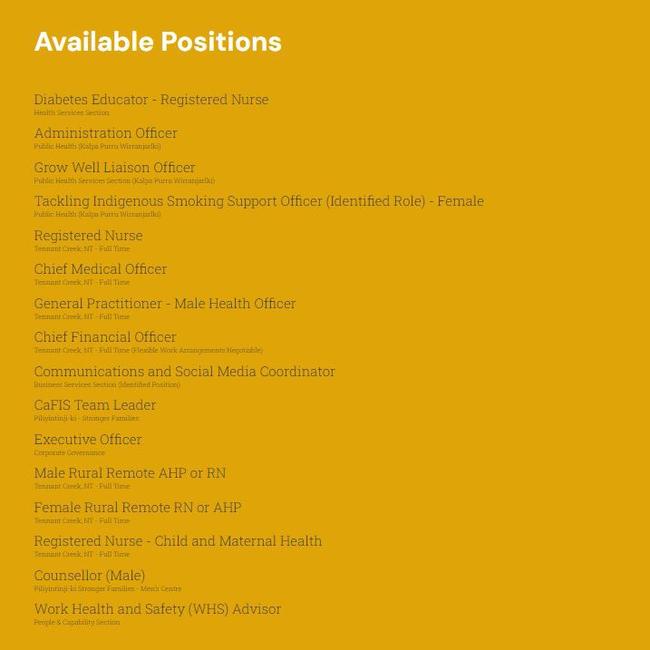First Nations healthcare NT: Local services face staffing crisis with vacancies up 160 per cent
“The whole time I was there, there were four positions that needed filling”: First Nations primary health care providers in the NT are facing a staffing crisis, with one ex-worker sharing the toll it took on her meagre team.

Northern Territory
Don't miss out on the headlines from Northern Territory. Followed categories will be added to My News.
The number of full-time equivalent staff vacancies at First Nations-specific primary health care providers in the Northern Territory has more than doubled in the space of four years, with one former employee sharing her experiences of working in what was effectively a skeleton crew.
Earlier this year, the Australian Institute of Health and Welfare released its latest Aboriginal and Torres Strait Islander specific primary health care report.
On the surface, it paints a picture of growth for the Territory.
Between June 30, 2019 and June 30, 2023, the number of full-time equivalent (FTE) employees rose from 1587 to 1782, with the number of providers relatively constant over the four years (70 down to 66).
However, despite the overall growth of the number of employees delivering services specifically to First Nations Territorians, the number of staff vacancies has grown precipitously.
On June 30, 2019, there were 156.3 FTE vacancies across the sector.
However, four years later, on June 30, 2019, this had swollen to 406.9 – a rise of more than 160 per cent.
A former employee of Tennant Creek-based Anyinginyi Health Aboriginal Corporation, Beck White, told the NT News that when she worked at the service as a case manager, her team had been decimated by vacancies.

“The whole time I was there, there were four positions that needed filling [in my team],” she said.
“There were quite a number of periods where it was just me and a part-time Indigenous liaison officer.
“The whole team should have been the team leader [me], a youth worker, a male child and family intensive support (CaFIS) case worker and a female CaFIS case worker, a youth support worker and a CaFIS support worker.
“It should have been five [FTE] people, but for nine to 10 months it was just me and one person part-time.”
The holes in her team took their toll on what staff there were.
“I poached somebody else from another section, she was absolutely fantastic, she was Indigenous and from Queensland,” Ms White said.
“She just became burnt out very quickly, seeing her people and the serious issues and not being able to have the resources in place to properly address the issues.
“Especially with youth [cases], there is no psychologist, there are no trained social workers in town, and the ones that are here only take on extreme cases.
“There is no opportunity for early intervention.
“There’s no point referring to Alice Springs because a lot of those appointments are done through telehealth and that’s just not realistic.”
Anyinginyi and NACCHO, the national leadership body for Aboriginal Community Controlled Health Organisations in Australia, were contacted for comment.
According to Anyinginyi’s website, there are 16 vacancies currently being advertised.
They include chief medical officer, registered nurse, Tackling Indigenous Smoking support officer, general practitioner, and CaFIS team leader – Ms White’s old role.
Other First Nations primary health care providers are also advertising large numbers of roles.
Miwatj Health Aboriginal Corporation has at least 11 vacancies; Wurli-Wurlinjang Health Service eight; Sunrise Health Service Aboriginal Corporation at least nine; and Mala’la Health Service Aboriginal Corporation eight.
NACCHO recently launched a First Nations Health Worker Traineeship program, with the aim of certifying up to 500 First Nations individuals as either Aboriginal health workers or Aboriginal health practitioners by 2027.
It said the sector faced “critical workforce shortages”.





